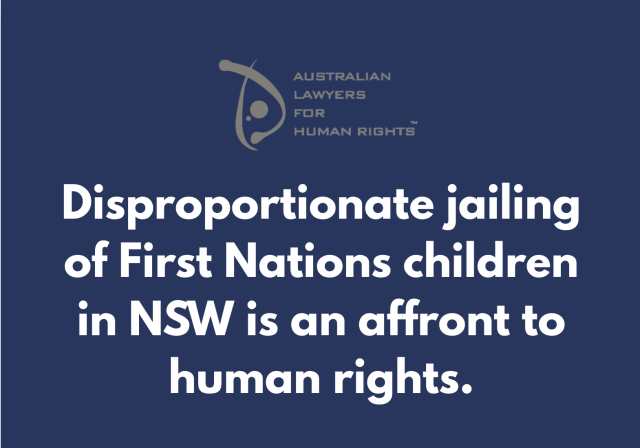Disproportionate jailing of First Nations children in NSW is an affront to human rights.

New data released by the NSW Bureau of Crime Statistics and Research (BOSCAR) reveals a 34% increase in the number of young people in custody since June 2023. First Nations children now account for 60% of children in detention, despite making up just 8% of young people in NSW. This marks an alarming 36% increase in the jailing of First Nations children over the past two years.
Australian Lawyers for Human Rights (ALHR) Vice President and Chair of Children’s Rights, Kerry Weste said:
“These figures are shocking. This is not what meaningfully trying to Close the Gap looks like. The Government is aware of the evidence showing that time spent in detention is one of the biggest predictors of recidivism. It knows that most children caught up in the criminal justice system have experienced trauma, systemic discrimination, and many have disability.
Locking these children up away from Country, community, culture, family, education and trauma-informed supports does not reduce crime and does not make our communities safer – but it does cause life long harm to children.
The Minns Government’s March 2024 unprecedented child bail laws have only condemned more children to suffer harm instead of help. 85% of children refused bail under these measures are First Nations, yet these damaging laws were extended.
The fact that 3 in 4 children held in detention in NSW are being held on remand and have not yet been convicted, flies in the face of Australia’s obligations under the United Nations Convention on the Rights of the Child (CRC). The best interests of the child must be a primary consideration and the jailing of children should always be a measure of last resort [1].
We must shift the dial away from archaic, punitive approaches that send children to jail.
Countries like Scotland have comprehensively incorporated the CRC into their domestic law and have removed all children under 18 years of age from prisons and young offender institutions. Meanwhile in NSW children as young as 10 can be jailed and have little to no legal protection of their fundamental human rights.
This has to change.
The UN Committee on the Rights of the Child has consistently called on Australia to raise the minimum age of criminal responsibility to at least 14 years. This call reflects medical evidence, the global median age and it has been echoed repeatedly throughout the UN human rights system; including by the UN Human Rights Council, the UN Committee on the Elimination of Racial Discrimination and the UN Special Rapporteur on the Rights of Indigenous Peoples.
ALHR calls on the NSW Government to urgently raise the age of criminal responsibility to 14 years.
We further call on the Government to urgently engage with First Nations organisations to implement evidence-based community-led and trauma informed solutions that divert children away from police, court and prison.
First Nations communities in NSW have the solutions. They need the Minns Government to listen.”
For all media inquiries, contact Julie Connolly: sydney@jcp.com.au M:+ 61 418 470 203
Read the media release from the Aboriginal Legal Service NSW/ACT here
Find out more about the campaign to Raise The Age in NSW here
[1] Relevantly, the CRC provides:
Art 3(1): In all actions concerning children, whether undertaken by public or private social welfare institutions, courts of law, administrative authorities or legislative bodies, the best interests of the child shall be a primary consideration…
Art 37(b): The arrest, detention or imprisonment of a child shall be in conformity with the law and shall be used only as a measure of last resort and for the shortest appropriate period of time.
Art 40(3)(b): Whenever appropriate and desirable, measures for dealing with such children without resorting to judicial proceedings, providing that human rights and legal safeguards are fully respected…[and that a] variety of dispositions…shall be available to ensure that children are dealt with in a manner appropriate to their well-being and proportionate both to their circumstances and the offence.



